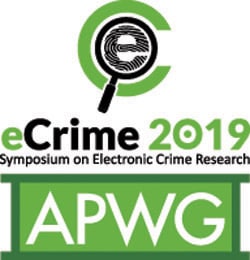eCrime 2019 – Symposium on Electronic Crime Research
 eCrime 2019 – Pittsburgh, PA – November 13, 14 & 15
eCrime 2019 – Pittsburgh, PA – November 13, 14 & 15
For 2019 APWG’s members will once again come together to bridge the gaps between cybersecurity operations, research and consumer messaging with our fourteenth Symposium on Electronic Crime Research (eCrime 2019).
eCrime 2019 will look at the operational challenges and development of common resources and best practices for first responders and forensic professionals. In addition, the conference will dive into current research projects and future areas of interest for cybercrime investigations, forensic techniques and infrastructure defense. including our peer-reviewed cybercrime published paper program with the IEEE-SA.
Operational and research insights for fighting electronic crime will be complimented and augmented with discussions on citizen awareness programs to help ensure a secure computing environment. This year’s meeting will bring a focus on the shifting nature of cybercrime and the inherent challenges of managing that dynamic threatscape.
With eCrime 2019 we will review the development of response paradigms and resources for counter-cybercrime managers and forensic professionals in the private and public sectors. Presenters will review case studies of national and regional economies under attack, narratives of successful trans-national forensic cooperation, while considering models for cooperation against ecrime and examining resources for cybercrime response and forensic enterprise.
This program will be held on November 13th – 15th at Carnegie Mellon University, Pittsburgh, PA, USA.
Please contact Deputy-Secretary Foy Shiver for details via email at foy@apwg.org.






